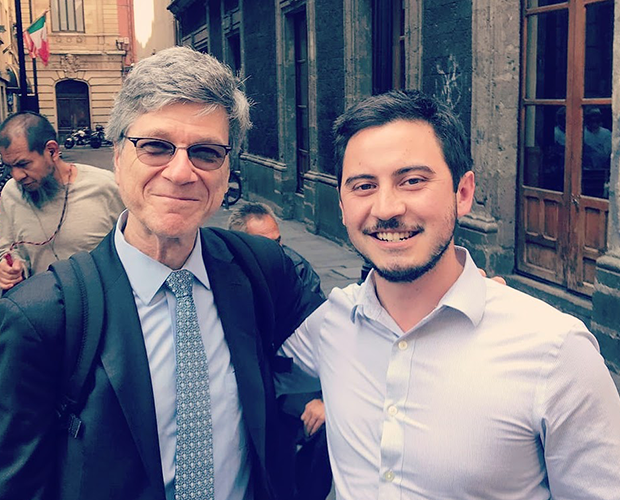Walking the path to global sustainability

Alumnus Andrés Prieto, MPP ’19, unearths pathways to sustainable land and food systems in Mexico City as part of the United Nations network
Aug. 28, 2019 | By Rachel Hommel | GPS News
For Andrés Prieto, his last six months at the UC San Diego School of Global Policy and Strategy (GPS) was spent working on some of the most pressing challenges in environmental policy, as part of the Food, Agriculture, Biodiversity, Land-Use and Energy (FABLE) Consortium.
Sponsored by the UN’s Sustainable Solutions Development Network (SDSN) and the International Institute for Applied Systems Analysis (IIASA), the project’s goal is to
transition countries towards the Sustainable Development Goals (SDGs) and objectives laid out in the Paris Agreement. Today’s global food and land-use systems do not meet these needs, and a solution is desperately needed.
“I’m terrified by climate change. We need to do something, the data is there,” said Prieto. “This kind of research gives me purpose; it’s incredibly important work that I was thrilled to take on.”
FABLE comprises 19 country teams, which develop data and modeling infrastructure to promote integrated strategies towards sustainable land-use and food systems. Prieto worked alongside Professor Gordon McCord, analyzing long-term strategies in his native country of Mexico while focusing on global benchmarks to ensure that food and land use become more sustainable.
“To deal with complex challenges such as sustainable land use, governments need to move to cross-cutting mechanisms for dialogue and planning,” said McCord. “This work isn’t just about producing papers; the really important piece is informing government policy directly. You cannot do this without all the players at the table.”
Now more than ever, countries are facing rapid biodiversity loss, greenhouse gas emissions, chemical pollution and water stress. Development is complex, yet all the more urgent to address. Putting together a team that included ecologists, biologists and agricultural economists, McCord and Prieto cite the importance of modeling for the future, providing a framework for the transformation of diets, agricultural systems and land use management.

“We are running out of space,” warns Prieto. The project’s goal is to model the future and to determine how we can use land more efficiently.”
For this project, the FABLE Consortium has identified three pillars for sustainable development – efficient and resilient agriculture systems, conservation and restoration of biodiversity and food security and healthy diets. With these laid out, the hope is not only to connect governments with local researchers, but also to have them talk about the policies necessary to achieve these goals.
“We are moving together on a global level, all for a common set of goals under the same framework,” said McCord. “Modeling will continue to get more sophisticated. We are building the tools to integrate the economic, ecological, nutritional and climate challenges of land.”
The team in Mexico is multidisciplinary and cross-cultural, with representatives from Mexico’s most prestigious universities and research institutes such as National Autonomous University of Mexico (UNAM) and the International Maize and Wheat Improvement Center, talking about salient issues tied back to climate change, including deforestation, the reduction of biodiversity and the decrease in the quality of air and water, as a result of food production.
“We really promoted discussion between universities and the government to try and get people talking about these issues,” said Prieto. “Everything in this system is interconnected. We want people to care more about land and food system issues. It’s time to radically transform the industry.”
 Creating a sensitivity analysis, Prieto helped assist with modeling, able to shape and tailor the data to see changes in critical parameters. Discovering the model was sensitive to variables such as changes in population and demand for meats sourced from ruminant animals like cows and goats, policymakers should likely place more emphasis on shaping food consumption and production patterns, in an effort to slow down emissions of methane, a major contributor to climate change.
Creating a sensitivity analysis, Prieto helped assist with modeling, able to shape and tailor the data to see changes in critical parameters. Discovering the model was sensitive to variables such as changes in population and demand for meats sourced from ruminant animals like cows and goats, policymakers should likely place more emphasis on shaping food consumption and production patterns, in an effort to slow down emissions of methane, a major contributor to climate change.
Learning these techniques and applications in his Policy Analysis course at GPS, Prieto suggests always reaching out to professors to get involved and to seize opportunities to go beyond the classroom. Eager to continue his work in energy, he will be working at Third Way’s Clean Energy Department in Washington, D.C. to do research on different alternatives to decarbonize the grid.
“My familiarity with data and economics was very helpful for the practicality of this project,” said Prieto. “My advice to current students would be to really get to know your professors. Get involved. They will find value in you and consider you for opportunities to get your hands dirty with data!”
To learn more about the project and FABLE network, visit the Mexico team website at fable-mexico.org and the official UN SDSN website here.

